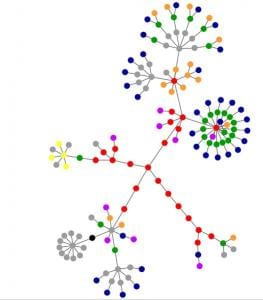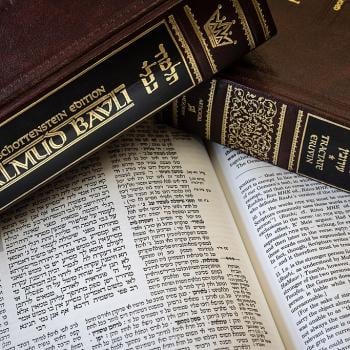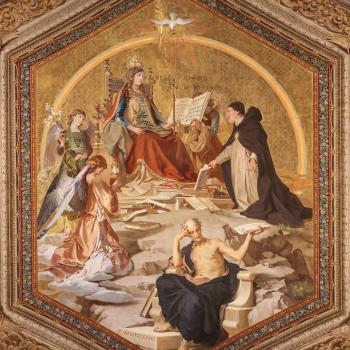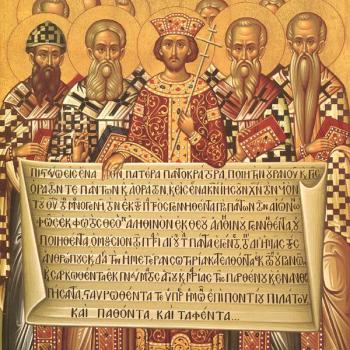
Language is constantly evolving. Words change their meaning over time. This is why it is easy to misinterpret what an old text. We will tend to interpret it anachronistically, thinking the words used in it mean the same thing as they do today. Certainly, we do not do this with all ancient texts, nor with all the words which have changed their meaning, but we do it enough to cause us hermeneutical problems. While this can be, and is, often a problem in many fields of research, it is a special problem in theology. While the same words have different meanings based upon the time and place in which they are used, once the word has taken in a significant technical meaning, all previous use of the word can be, and often is, misread as if that technical meaning was intended, or others, only knowing the older meaning of the word, will not understand its new use and so end up rejecting texts which represent notions they otherwise believe.
Many theological debates are the result of this kind of misunderstanding. We can see this in the way the works of St. Cyril of Alexandria are read and interpreted by subsequent Christians. When people read him talking about “one incarnate nature” of Christ, some read it, not within the context of how he understood the word “nature,” but with the later, more developed, distinct meaning of “nature” which was distinguished from “person.” Others, however, read it in the way he did not differentiate between person and nature, and they are the ones who deny Christ as having two natures. If everyone understood how loose the terms “nature” and “person” were used during the time of St. Cyril, and before him (such as at Nicea), so that the two often were used to indicate the same meaning, then one can see why it would be wrong to read the later, distinct, technical use of the word “nature” into St. Cyril’s text. St. Cyril, in his own lifetime, came to understand the problem was not one of vocabulary but the meaning behind the vocabulary, so that he could find a unity of faith with those who used the words with different meanings.[1] Sadly, many of his readers did not appreciate this fact; instead of trying to follow the meaning intended by his writings, they reified his word choice, demanding people to use his particular phraseology of “one incarnate nature.” While those who follow Cyril often followed his own loose use of the term “nature,” so they could accept union with those following an Antiochian formulation, there were those who read Cyril anachronistically, who understood nature in its later, technical meaning, and so ended up denying Christ as having two natures after the incarnation. This means that some who rejected Chalcedon did so because they truly held a heretical interpretation of Cyril, but most did not read Cyril in this way.[2]
When dealing with theological statements, what matters is what was intended by declarations. The words are, to be sure, important, as they can help us discern the intended meaning, but we must understand that the words used only act as servants to that meaning. We must not become overly attached to the words themselves; that is, we must not tie down the higher truths of theology to words and then think that the way theology is done, the way faith is properly proclaimed, is by repeating the right words while rejecting the wrong words. If at one time and place, a particular word is condemned, we must find out why it was condemned. We can understand the condemnation of the word homoousios at the Council of Antioch around 269 by realizing it was condemned due to the way it was employed by Paul of Samosata, who used it in a way which denied the personal realities of the Father, Son and Holy Spirit. When Nicea used homoousios, Arians pointed out how the word had been condemned, but they ignored why it was condemned, for then they would realize that the word was used far differently by Paul of Samosata than it was used by those who established the Nicene Creed. This is why, after Nicea, when many of those who questioned the use of the word homoousios, examined how it was used at Nicea, came to accept Nicea and its use of homoousios, showing us that some of the contention after Nicea came from a misunderstanding instead of any substantial theological disagreement. Thus St. Cyril of Jerusalem, when he learned the actual meaning of Nicea, embraced its teachings, although at one time he was seen as rejecting the council itself.
What is true about word choice is also true about theological systems. The value of those systems lies in the meaning being pointed by them. Just as words cannot contain but only point to the transcendent truth, so systems, which rely upon words and technical definitions given to such words, cannot comprehend the transcendent truth but can only point to it. Various theological systems have developed over time. Each of them offers us ways to engage theological truths. They have helped us find some kind of explanation for the great mysteries of the faith, and in doing so, provided the basic framework which people needed in order to believe. In this regard, they have been of great service to the faith. The problem which we must face and reject is the confusion which some people have who think a particular theological system alone represents the truth and only those who follow it can therefore apprehend the truth. When this happens, the theological truth becomes lost, as the limited awareness and potential involved within any given system hinders those who absolutize such a system from searching for and experiencing the transcendent truth. And when two rival theological systems meet, if their adherents understand the limitations of their particular system, they can learn from and appreciate each other. But if they are strict adherents to their systems so that they confuse the truth as being only what is contained in their system, then they look to criticize and reject every other system, and so misread the other system in order to justify their criticism. This is often what is done in Catholic and Orthodox theological debates, such as in the ways some Thomists engage Palamas or in the way some Orthodox engage the filioque[3] Instead of trying to discern the greater meaning being pointed to by the other, the debate becomes centered on externals, and since the external details are different, never shall the two meet.
Theological debates are tricky. It must not be turned into a free for all. Not everything which can be asserted or intended is true. But the problem is that we must ascertain the intended meaning behind any given assertion. Sometimes, this is easy, as an author gives us enough material for us to understand what they mean by particular words. Often, this is not the case, and things are much more difficult, such as when we are trying to understand what an author meant when we only have a few fragments of their works to use to establish such an understanding. When we have only a limited ability to interpret a particular text or theological tradition, it is important for us to note the possible range of interpretations which can be had from a it, indicate which of them are acceptable, and which are not. Then, unless we have evidence to the contrary, we must assume that one of the acceptable meanings is what was intended, so as to give as charitable a reading as possible in order to sustain the love and respect which we should have as Christians for each other.
[1] See, for example, St. Cyril of Alexandria, “Letter 39” in Letters 1-50. Trans. John I. McEnerney (Washington, DC: CUA Press, 1987), 147-52.
[2] This is why, in modern ecumenical engagements, where we find this problem has been recognized, Christians finally are able to get beyond the issue of word choice and look to the meaning intended by both sides and find a common unity of faith, allowing for official statements indicating their common Christological understanding.
[3] For example, we find many Thomists falsely claiming that Palamas denied divine simplicity. If they studied Palamas, they would learn, far from denying divine simplicity, it is a foundation of his theological system. See, for example, Marcus Plested, “St. Gregory Palamas on Divine Simplicity” in Modern Theology vol. 35 no. 3 (2019): 508-521 and Mark K. Spencer, “The Flexibility of Divine Simplicity: Aquinas, Scotus and Palamas” in the International Philosophical Quarterly vol. 57 no. 2 (2017): 123-139.
Stay in touch! Like A Little Bit of Nothing on Facebook.
If you liked what you read, please consider sharing it with your friends and family!













